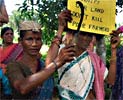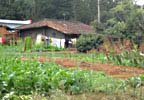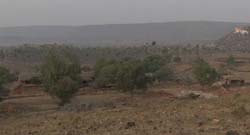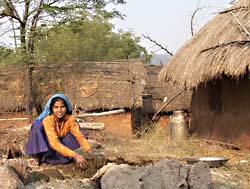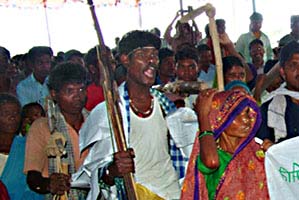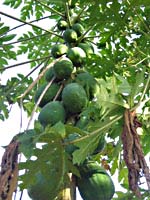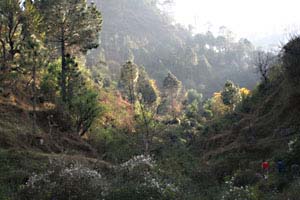‘We are Living Here for Generations’
Forest Dwellers in Sariska Tiger Reserve Will not Leave
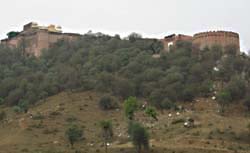 Old fort on the top of the hill has to become a luxury hotel.
Old fort on the top of the hill has to become a luxury hotel.
In the north of the West Indian state Rajasthan we find the Kankwari fort. It is on the top of a hill. It looks like a fairytale castle with big towers and solid walls. At the foot of the hill flows a friendly small river to a small lake with date palm trees and a village. The cows and buffalos just came back from the forest and are milked now. Some goats are grazing next to the farms. Yes, it looks so idyllic. But at the same time a serious struggle is going on.
The name of the village is Pilapanni. It is in the Sariska Tiger Reserve. According to the new Forest Law the villagers have the right to stay here, because they are living here already a long time. But the Forest Department does everything it can to make the life of the villagers as difficult as possible. The fort must become a luxury hotel for rich people from Mumbai or abroad. And the Forest Department wants the villagers to leave, so they just can do with the forest they like. And get a lot of money from the rich tourists.
The Forest Department forbids the villagers to do agriculture on the fields. Still they have their cows, buffalos and goats. In the green season they go around in the forest and find grasses and leaves on their own. In the same months the women gather as much leaves as possible to feed them in the dry season at the farm. In the rainy season, when the cows give a lot of milk they cook khoa, a milk product which they sell to the sweet makers in the town.
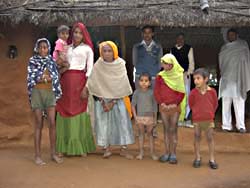 Old grandmother: "I was born here, I will die here."
Old grandmother: "I was born here, I will die here."
“We will not leave this place. We are living here for generations, for more than two
hundred years”, says Lakshmi Narain Patel. Together with his wife, his two brothers, two sisters in
law and ten children they live here on their family farm. Already ten years they are struggling to get the
official paper they stay here already a long time.
“There is no health care. There is a small school, but the teacher comes only one time in a week.
We have a very bad road, so we cannot reach the city easily. The Forest Department forbids us to construct
any new building. We even have not any longer the right to do farming.” Their cattle were taken by
the Forest Department, they were harassed, and there were many court cases against them. But this family is well
decided to stay, whatever the future will bring. Patel: “I know very well, when you raise your voice for your
land rights, you will be named a ‘Maoist’, or a ‘Naxalite’”. Still they will go
on with their struggle.
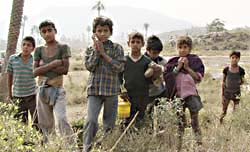 These children need a school in the village.
These children need a school in the village.
Several ngos, for example Upkar Sansthan, bring information to the villagers, organise discussions and invite them to go to the demonstrations. The Pilapanni villagers together with their sarpanch (village head) went for a big national demonstration and a ten day street camp in New Delhi for improvement of the Forest Law. The campaign was successful. The next step is to get the improved Forest Law implemented. They had already a demonstration for it in Jaipur, the state capital.
The villagers who accepted compensation money and a piece of land outside the reserve are disappointed now. Patel: “One of our family members came back to visit us and started weeping. ‘We made a mistake’, she told us. Because it is a small piece of land and because there is no forest there. Here the cattle can find feed in the forest on their own for five, six months a year. But there you have to grow it or to buy it. Here you can collect dry wood for cooking for free in the forest; there you have to buy everything. Life is so expensive there.”
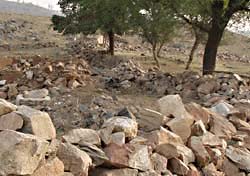 The people who left the village for compensation money had to destroy their own houses.
The people who left the village for compensation money had to destroy their own houses.
The villagers from Pilapanni go on with their life as well as possible. Together they desilted the village lake. They discuss to start a school themselves for small children with one of the villagers as a teacher. The children will get non-formal education, with a lot of stories and songs to bring a bit more life in the village. The villagers also got the idea to plant fruit and fodder trees. It will give them vitamins and extra feed for the cattle.
Go to next page: No Licence To Kill
Go to overview articles Rajasthan
